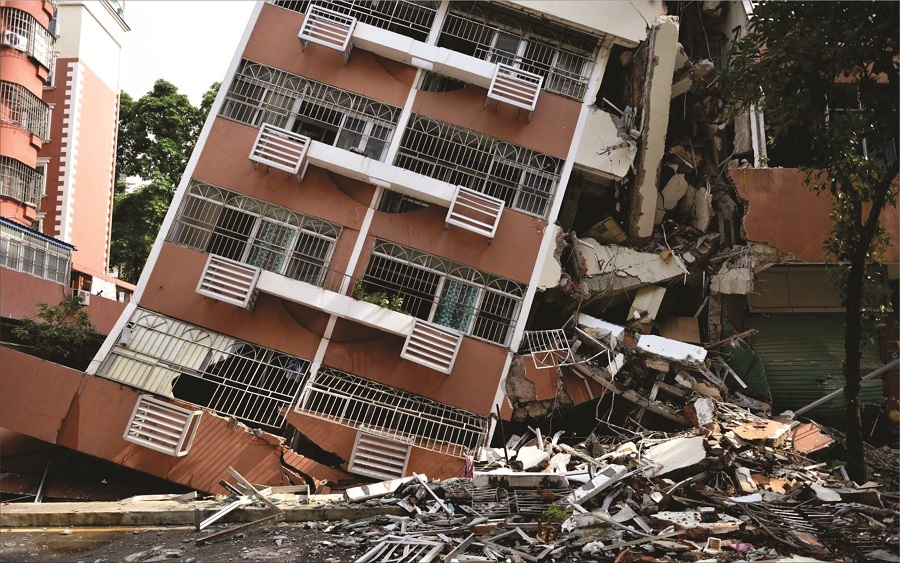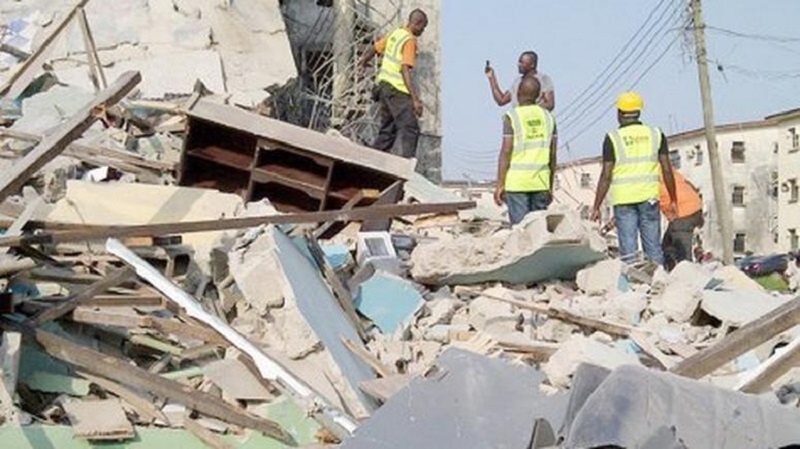The spate of building collapse in Nigeria has been steadily increasing over the past few years, drawing concerns from the government and other stakeholders.
Several factors have been fingered as the causes of building collapse in Nigeria, chiefly the use of substandard building materials, the deployment of unsafe but cost-cutting techniques in housing construction and the lack of professional supervision at various levels of the construction process.
In addition to the established causes of building collapse, data from developed countries show that many of the recorded cases in these climes are due to the fact that the current codes of practice do not make provisions for unexpected loads and an unexpected failure of a single member may lead to an all-round collapse of the entire structure.
The death rate from collapsed buildings may not be comparable to those from other ghastly incidents such as plane crashes or road accidents, but death from building collapse does occur and the numbers are significant.
Mr Kunle Awobodu, National President, Building Collapse Prevention Guild (BCPG), stated that there were over 1,000 buildings unfit for human habitation in Lagos Island alone, while 36,000 potential collapsed buildings were waiting to happen across Lagos.
Awobodu made the disclosure in a recent interview where he explained that BCPG had brought such distressed buildings to the notice of the Lagos State Building Control Agency (LASBCA) for demolition.
Between 2011 and 2019, over 84 buildings collapsed across Nigeria. Only 21 out of the 84 occurred outside Lagos. This means more attention needs to be paid to the Centre of Excellence. Although the Lagos State government has demolished scores of distressed buildings in the last one year, the hazard has not been completely eliminated.
Some cases of building collapse around the country in the last 10 years
2011
- 5-storey building on Tinubu street, VI, Lagos
2012
- Oba Ile Housing Estate, Akure
- 2-storey building at Mararaba, Abuja
- 3-storey building at Idumota
- 2 storey building at Gwarinpa Estate Abuja
2013
- 1 storey building at Apo Mechanic Village, Abuja
- 101-year-old 3-storey commercial/resident building at Hadeja Road by Ibrahim Taiwo Road, Gombe
- 3-storey building at Ojodu, Lagos
- 2-storey uncompleted building at Ishaga Road, Surulere Lagos.
2014
- A hostel building under construction at Akure, Ondo
- An uncompleted church building, Agudama-Epie, near Yenagoa, Bayelsa state
- An uncompleted four-storey building at Onitsha, Anambra state
2015
- 3-storey residential building at Ebute meta Lagos
2016
- 5-storey building Under Construction at Lekki, Lagos
- 3-storey building, Malete, Kwara state
2017
- Residential building, Lagos Island
2018
- 7- storey building under construction, Port-Harcourt, Rivers.
2019
The fight against building collapse suffered a setback as the country recorded not less than 43 incidents within the year. Figures obtained from a source at the Building Collapse Prevention Guild, an advocacy group of built environment professionals, revealed that Lagos had the highest figure with 17 cases, accounting for about 39.53% of the total number of collapsed buildings.
Anambra State had the second-highest number with six collapsed buildings, while Plateau and Delta states recorded three each. Oyo, Enugu, Ondo and Osun states recorded two collapsed buildings each in 2019 while Imo, Kwara, Abia, Adamawa and Katsina states each had one building collapse incident.
According to the figures, 59% of the collapsed buildings in Lagos State in 2019 were existing structures while 41% were under construction; seven of the cases were full collapse and ten (10) were partial.
Why the buildings collapsed
The former Chairman of the Nigerian Institute of Building (NIoB), Mr James Ogbagha explained that most of the tragedies were 100% preventable. According to him, the failure of appropriate authorities to do the needful led to these tragedies.
“NIoB has continued to warn successive governments of the dangers because as professionals, the dangers were obvious and it is the lack of appropriate regulations in the sector that led to the construction of weak structures, which eventually collapsed,” Ogbagha said.
Like Ogbagha, Abidemi Bello, a fellow of the Nigerian Institute of Quantity Surveyors, explained that the fight against building collapse had been tough as most buildings were not constructed by people trained to do so. He observed that professionals participated in less than 20% of the total volume of construction activities going on across the nation.
“On every building site, there should be a builder to monitor the process. The onus is on the builder to ensure that nothing untoward happens on that site because the recent development is bad for the image of the built environment. But we have many cases where non-professionals are in charge. The construction professionals have been reduced to onlookers on the building construction and procurement scene,” Bello stated.
What experts are saying about solutions
According to Mr James Ogbagha, “The right thing to do, as it is done in other climes, is that every building that will be built must go through a number of processes. The various checks are to ensure that the progress of work is safe. It is as a result of adhering to set rules that the skyscrapers in Europe and America are still standing strong, even after decades.
Government agencies must ensure that designs are according to the plan for the areas where the houses are to be built. Then, there must be soil test to confirm that the type of building planned for the soil type is appropriate. This is because some soil types cannot bear the weight of some massive buildings, therefore the house can sink and thereafter get soaked and collapse.
Your design stages must be evaluated and put to test. The architect designs the drawing; the structural engineer designs the structural elements. All these are put together and handed over to the professional, who is trained to build, the builder. If all these were followed, the incidences of building collapse would never have happened. But the contrary is the case in Nigeria. Anybody can mix a bag of cement and put bricks upon other bricks and boast of having built a house. It is very hazardous to live in such houses.”
Ifeanyi Maduka, a civil engineer noted, “Landlords must start to take the issue of safety more seriously. There are many instances where landlords cut corners while building both in the area of hiring professionals to supervise their building projects and also in the use of building materials. These things have to stop and the government has to see to it that they stop.”
Bottomline
In order to deliver safe buildings and save lives, the input of the various professionals in the building process must not be circumvented. The government also needs to do more with regards to granting building permits, carrying out periodic unannounced inspections at building sites and visibly punishing defaulters to send a strong message of intolerance for substandard building projects.























Kindly, provide a caption to collapse building shown above. The location and when. I suspect it is a foreign picture.